Time:2025-07-14
The Essence of Custom Neon Signs
In the realm of visual communication and design, custom neon signs stand as a testament to the fusion of artistic expression and technological innovation. These bespoke illuminated creations transcend mere signage, serving as powerful tools for brand storytelling, environmental enhancement, and emotional engagement. From the vibrant storefronts of urban retail spaces to the intimate corners of residential interiors, custom neon signs offer a unique blend of nostalgia, modernity, and personalization, capable of transforming any space into a captivating visual narrative. This article explores the technical foundations, design principles, and diverse applications of custom neon signs, providing a comprehensive guide for businesses, designers, and enthusiasts seeking to leverage their transformative potential.
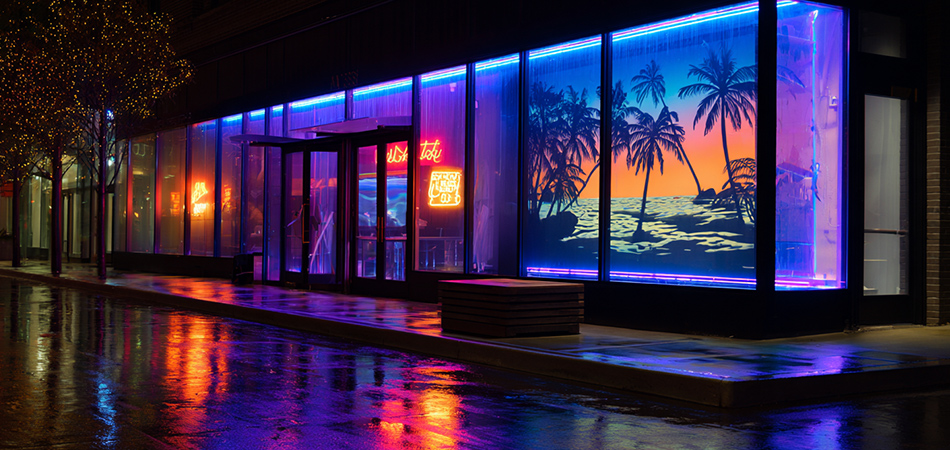
Technical Foundations: The Craft of Illumination
Traditional Glass Neon vs. Modern LED Neon
Glass Neon: The Timeless Craft
Artisanal Fabrication: Traditional custom neon signs are handcrafted using borosilicate glass tubes, bent into precise shapes over gas-fired burners by skilled artisans. These tubes are then filled with noble gases—neon for red, argon with mercury for blue, and combinations for other hues—creating the iconic glow through electrical ionization.
Warm, Organic Aura: The soft, diffused light of glass neon exudes a vintage charm, ideal for evoking nostalgia in retro-themed spaces. However, its fragility and high-voltage requirements necessitate careful handling and professional installation.
LED Neon: The Modern Evolution
Flexible LED Neon Flex: Modern custom neon signs often utilize LED neon flex, a flexible strip embedding surface-mounted LEDs in silicone or PVC casings. This technology offers:
Durability: Resistance to impact, moisture, and UV radiation, making it suitable for outdoor and high-traffic environments.
Energy Efficiency: Operating at low voltage (12V/24V DC), consuming up to 80% less energy than traditional neon while maintaining vibrant illumination.
Design Freedom: Bendable to tight radii (15–30mm), enabling complex shapes, intricate lettering, and seamless integration into architectural features.
Core Components for Customization
Substrate and Encapsulation:
Backing Materials: Acrylic, metal, or wood backings provide structural support and aesthetic contrast, with options for backlighting or halo effects to enhance depth.
Sealing Technology: IP65/IP67 ratings for outdoor signs, ensuring waterproof and dustproof performance through silicone overmolding or PVC sheathing.
Control Systems:
Dimming & Color Change: PWM (Pulse Width Modulation) for smooth brightness adjustment and RGB/RGBW capabilities for millions of color combinations, controlled via remotes, apps, or DMX512 systems.
Smart Integration: Bluetooth/Wi-Fi connectivity for remote management, enabling dynamic effects like fading, strobing, or music synchronization.
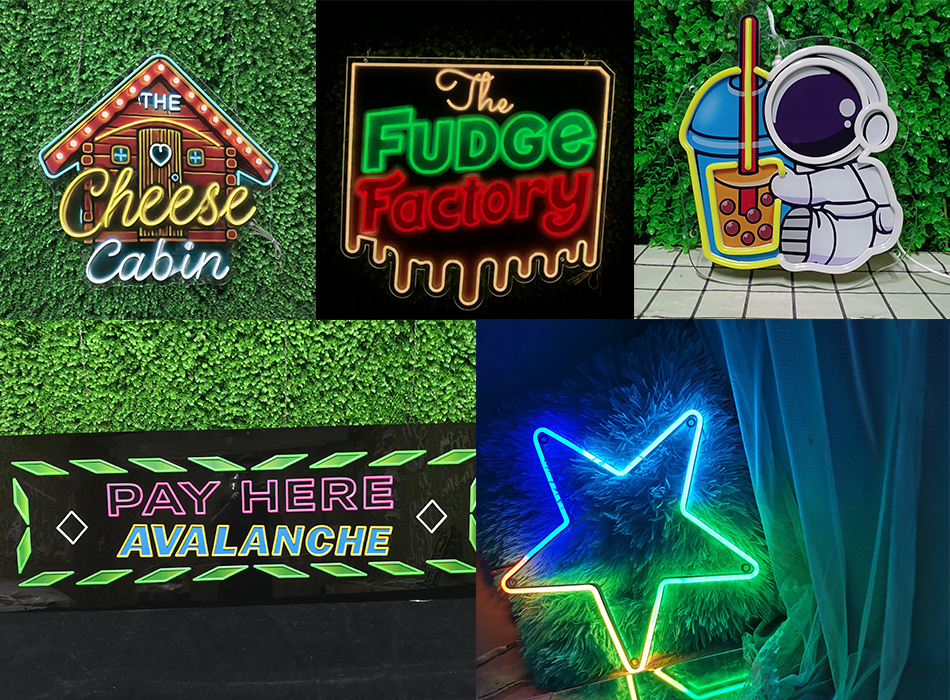
The Design Journey: From Vision to Reality
Concept Development: Translating Ideas into Light
Brand/Story Alignment: Collaborate with clients to distill their vision—whether it’s a brand logo, a motivational quote, or an abstract design—ensuring the sign reflects their identity, tone, and spatial context.
Mood Board Creation: Curate visual references, color palettes, and typography options, considering the sign’s intended environment (e.g., minimalist for modern offices, ornate for vintage cafes).
Material & Technique Selection
Font & Form Choices:
Legibility vs. Artistry: Sans-serif fonts for commercial clarity, script fonts for elegance, or custom lettering for unique brand identities.
3D Effects: Layered neon with acrylic backings for shadow effects, or floating designs for a minimalist aesthetic.
Color Psychology:
Brand Palettes: Matching Pantone colors for commercial signage to ensure visual consistency, or using contrasting hues to create focal points.
Emotional Tone: Warm reds/oranges for energy, cool blues/greens for calm, and pastels for soft sophistication.
Prototyping & Refinement
Digital Rendering: Use 3D modeling software to visualize the sign in the target space, adjusting scale, placement, and lighting effects.
Physical Samples: Fabricate small-scale prototypes to test color accuracy, material compatibility, and structural integrity before full production.
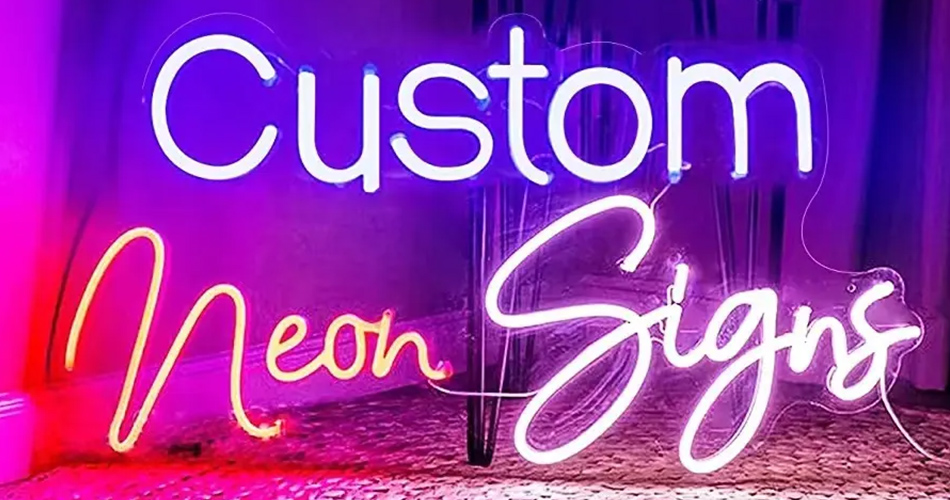
Strategic Applications Across Industries
Commercial Spaces: Branding with Brightness
Retail and Hospitality
Storefronts & Signage: Custom neon logos or taglines above entrances act as 24/7 brand beacons, with weatherproof designs ensuring durability in urban environments.
Restaurant Ambiance: Neon accents along bar counters, menu boards, or seating areas create thematic vibes—e.g., retro diner aesthetics with red-and-white neon or tropical motifs with green/pink hues.
Hotel Identity: Backlit logos in lobbies or themed neon art in guest rooms, enhancing brand recall and guest experience.
Office and Corporate Environments
Reception Centers: Large-scale neon installations reflecting company values or mission statements, fostering a professional yet creative atmosphere.
Open Office Zoning: Colored neon strips demarcating work zones (e.g., blue for focus areas, yellow for collaboration spaces), enhancing spatial organization with visual cues.
Residential Design: Personalized Illumination
Home Decor:
Bedroom Accents: Custom neon name signs or inspirational quotes above headboards, adding a personal touch with dimmable warm lighting.
Entertainment Areas: Neon art in home theaters or game rooms, with RGB options to match movie themes or gaming aesthetics.
Outdoor Living:
Garden Features: Weatherproof neon outlining pathways, pergolas, or pool edges, blending safety with nighttime charm.
Patio Signs: Custom designs for outdoor kitchens or lounge areas, powered by solar panels for eco-friendly illumination.
Events and Experiential Marketing
Pop-Up Installations: Lightweight LED neon signs for temporary retail activations or trade show booths, easily transportable and reconfigurable.
Weddings and Celebrations: Custom date-night signs, monograms, or thematic designs (e.g., geometric shapes for modern weddings, floral motifs for garden events), serving as memorable photo backdrops.
Art Installations: Collaborations with artists to create neon sculptures or interactive light displays, merging fine art with technology in galleries or public spaces.
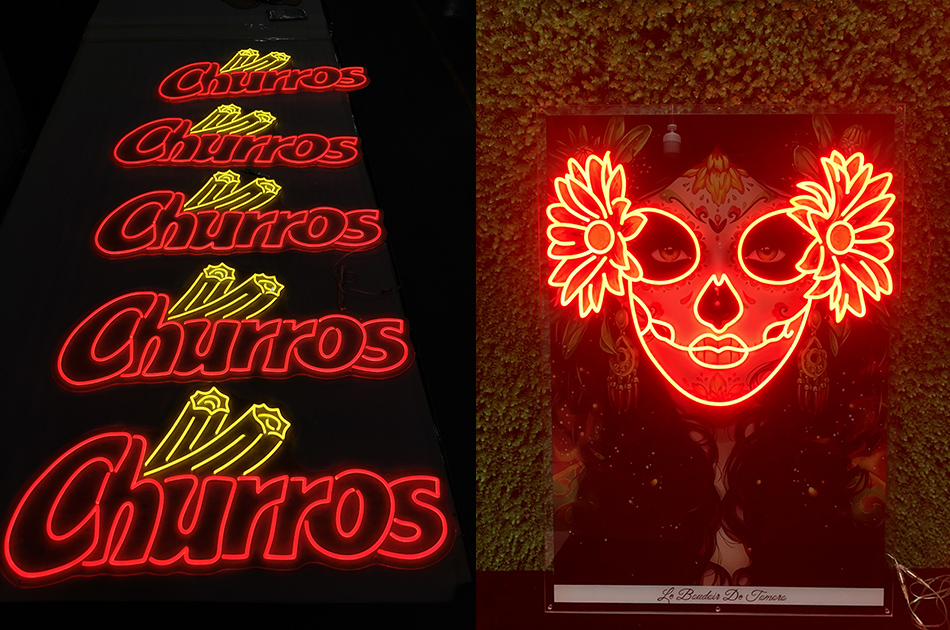
Installation & Maintenance Best Practices
Professional Installation: Ensuring Safety and Impact
Site Assessment: Evaluate structural load, electrical compatibility, and environmental factors (e.g., wind resistance for outdoor signs, fire codes for indoor spaces).
Mounting Techniques:
Indoor: Adhesive mounts, magnetic fixtures, or hidden brackets for a seamless look, ideal for drywall, glass, or metal surfaces.
Outdoor: Stainless steel brackets, waterproof connectors, and UV-resistant sealants to secure signs on facades, awnings, or freestanding frames.
Electrical Compliance: Use certified power supplies and wiring that meet local safety standards (e.g., UL 1838 for outdoor signage, CE EN 60598 for indoor).
Routine Maintenance: Prolonging Lifespan
Cleaning: Wipe glass neon tubes with microfiber cloths; use mild soap for LED neon flex casings, avoiding abrasive materials that may scratch surfaces.
Inspections:
Glass Neon: Monthly checks for tube integrity and gas leaks, addressing issues with professional re-gassing or tube replacement.
LED Neon: Quarterly reviews of electrical connections, driver functionality, and waterproof seals, especially for outdoor signs.
Software Updates: Regularly update smart control systems to ensure compatibility with new devices and access to enhanced features like voice activation or automated scheduling.
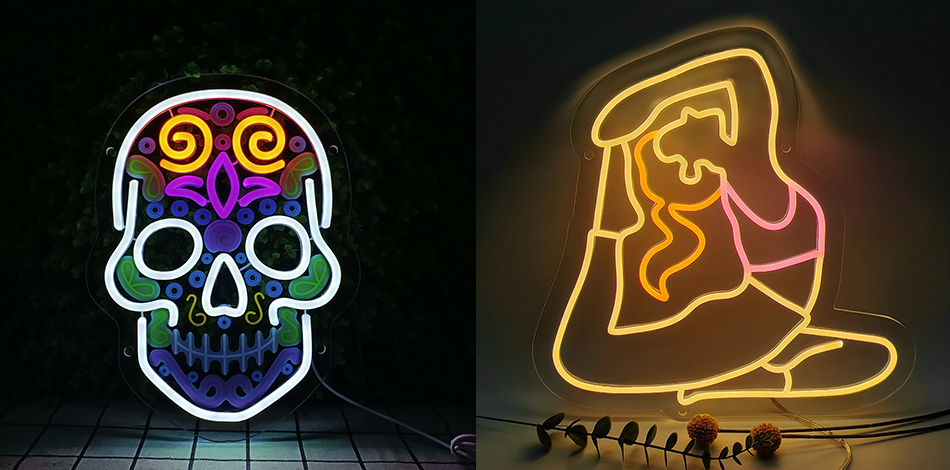
Selecting the Right Custom Neon Provider
Portfolio & Expertise
Diverse Projects: Look for providers with experience in similar applications (e.g., commercial branding, residential art) and a track record of complex customizations, such as 3D lettering or multi-layered designs.
Artisan Craftsmanship: For glass neon, verify the provider’s in-house bending and gas-filling capabilities; for LED neon, assess their CNC shaping and color-matching precision.
Customization Flexibility
Design Tools: Providers offering online design portals or in-person workshops for real-time adjustments to fonts, colors, and layouts.
Material Options: Availability of eco-friendly materials (recycled silicone, FSC-certified wood backings) for sustainability-focused projects.
Certification & Support
Safety Standards: Ensure compliance with UL, CE, or local electrical certifications to avoid regulatory issues.
After-Sales Service: Providers offering warranty coverage (2–5 years), remote troubleshooting, and maintenance packages for large-scale installations.
Innovations Shaping the Future of Custom Neon
Smart Technology Integration
AI-Driven Design: Algorithms generating optimized neon layouts based on spatial data, ensuring uniform illumination and minimal energy use.
Voice-Activated Control: Compatibility with Alexa, Google Assistant, or custom APIs for hands-free adjustment of color and brightness in smart homes or commercial spaces.
Sustainable Solutions
Eco-Materials: Neon signs using 40% recycled silicone casings and energy-efficient LEDs, aligning with global sustainability goals.
Energy Harvesting: Solar-powered neon for outdoor signs, storing energy during the day for nighttime operation in off-grid locations.
Advanced Fabrication Techniques
3D-Printed Components: Custom mounting brackets and diffusers created via 3D printing, enabling seamless integration with unique architectural features.
Micro-LED Precision: Ultra-compact LEDs allowing intricate details in logos and fine typography, ideal for high-end commercial signage.
Overcoming Common Challenges
Challenge 1: Complex Geometric Designs
Solution: Partner with providers using 3D modeling and CNC bending for precise shaping, ensuring even light distribution in intricate designs.
Challenge 2: Color Fading in Outdoor Signs
Solution: Specify UV-stabilized coatings and high-quality silicone encapsulation, paired with annual professional UV resistance treatments.
Challenge 3: Power Supply Reliability
Solution: Install surge protectors and redundant power supplies for critical commercial signs, minimizing downtime in case of outages.
Challenge 4: Budget Constraints
Solution: Opt for LED neon as a cost-effective alternative to glass neon, or prioritize key design elements (e.g., focal-point lettering with minimal backlighting).
Conclusion: The Enduring Allure of Custom Neon Signs
Custom neon signs are more than just illuminated decor; they are versatile storytellers, blending technical precision with artistic vision to transform spaces and convey messages with impact. Whether enhancing brand identity in commercial settings, adding personality to homes, or creating unforgettable moments at events, their ability to merge functionality with aesthetic appeal makes them a timeless choice in design.
As technology evolves and sustainability takes center stage, custom neon signs continue to adapt—incorporating smart controls, eco-friendly materials, and innovative fabrication techniques. By understanding their technical foundations, embracing creative design, and selecting experienced providers, businesses and individuals can harness the power of custom neon to craft spaces that not only shine brightly but also resonate deeply with their audience. In a world saturated with visual noise, custom neon signs stand out as beacons of individuality, proving that light itself can be a medium for art, brand, and connection.